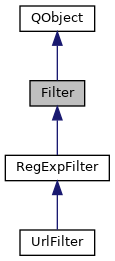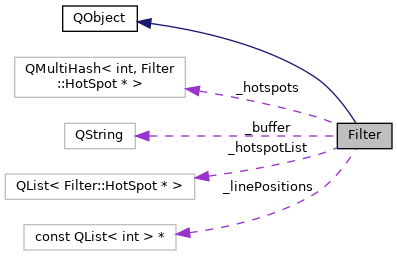A filter processes blocks of text looking for certain patterns (such as URLs or keywords from a list) and marks the areas which match the filter's patterns as 'hotspots'. More...
#include "Filter.h"


Classes | |
| class | HotSpot |
Public Types | |
| enum | Type { NotSpecified , Link , Marker , ErrorLink } |
| Represents an area of text which matched the pattern a particular filter has been looking for. More... | |
Public Member Functions | |
| Filter () | |
| Constructs a new filter. More... | |
| virtual | ~Filter () |
| HotSpot * | hotSpotAt (int line, int column) const |
| Adds a new line of text to the filter and increments the line count. More... | |
| QList< HotSpot * > | hotSpots () const |
| Returns the list of hotspots identified by the filter. More... | |
| QList< HotSpot * > | hotSpotsAtLine (int line) const |
| Returns the list of hotspots identified by the filter which occur on a given line. More... | |
| virtual void | process ()=0 |
| Causes the filter to process the block of text currently in its internal buffer. More... | |
| void | reset () |
| Empties the filters internal buffer and resets the line count back to 0. More... | |
| void | setBuffer (const QString *buffer, const QList< int > *linePositions) |
| TODO: Document me. More... | |
Protected Member Functions | |
| void | addHotSpot (HotSpot *) |
| Adds a new hotspot to the list. More... | |
| const QString * | buffer () |
| Returns the internal buffer. More... | |
| void | getLineColumn (int position, int &startLine, int &startColumn) |
| Converts a character position within buffer() to a line and column. More... | |
Private Attributes | |
| const QString * | _buffer |
| QList< HotSpot * > | _hotspotList |
| QMultiHash< int, HotSpot * > | _hotspots |
| const QList< int > * | _linePositions |
A filter processes blocks of text looking for certain patterns (such as URLs or keywords from a list) and marks the areas which match the filter's patterns as 'hotspots'.
Each hotspot has a type identifier associated with it ( such as a link or a highlighted section ), and an action. When the user performs some activity such as a mouse-click in a hotspot area ( the exact action will depend on what is displaying the block of text which the filter is processing ), the hotspot's activate() method should be called. Depending on the type of hotspot this will trigger a suitable response.
For example, if a hotspot represents a URL then a suitable action would be opening that URL in a web browser. Hotspots may have more than one action, in which case the list of actions can be obtained using the actions() method.
Different subclasses of filter will return different types of hotspot. Subclasses must reimplement the process() method to examine a block of text and identify sections of interest. When processing the text they should create instances of Filter::HotSpot subclasses for sections of interest and add them to the filter's list of hotspots using addHotSpot()
| enum Filter::Type |
Represents an area of text which matched the pattern a particular filter has been looking for.
Each hotspot has a type identifier associated with it ( such as a link or a highlighted section ), and an action. When the user performs some activity such as a mouse-click in a hotspot area ( the exact action will depend on what is displaying the block of text which the filter is processing ), the hotspot's activate() method should be called. Depending on the type of hotspot this will trigger a suitable response.
For example, if a hotspot represents a URL then a suitable action would be opening that URL in a web browser. Hotspots may have more than one action, in which case the list of actions can be obtained using the actions() method. These actions may then be displayed in a popup menu or toolbar for example.
| Enumerator | |
|---|---|
| NotSpecified | |
| Link | |
| Marker | |
| ErrorLink | |
| Filter::Filter | ( | ) |
Constructs a new filter.
Definition at line 177 of file Filter.cpp.
|
virtual |
Definition at line 183 of file Filter.cpp.
References _hotspotList.
|
protected |
Adds a new hotspot to the list.
Definition at line 249 of file Filter.cpp.
References _hotspotList, _hotspots, and Filter::HotSpot::startLine().
Referenced by RegExpFilter::process(), and UrlFilter::process().
|
protected |
Returns the internal buffer.
Definition at line 242 of file Filter.cpp.
References _buffer.
Referenced by RegExpFilter::process(), UrlFilter::process(), and setBuffer().
|
protected |
Converts a character position within buffer() to a line and column.
Definition at line 203 of file Filter.cpp.
References _buffer, and _linePositions.
Referenced by RegExpFilter::process(), and UrlFilter::process().
| Filter::HotSpot * Filter::hotSpotAt | ( | int | line, |
| int | column | ||
| ) | const |
Adds a new line of text to the filter and increments the line count.
Returns the hotspot which covers the given line and column, or 0 if no hotspot covers that area
Definition at line 267 of file Filter.cpp.
References _hotspots, Filter::HotSpot::endColumn(), Filter::HotSpot::endLine(), Filter::HotSpot::startColumn(), and Filter::HotSpot::startLine().
| QList< Filter::HotSpot * > Filter::hotSpots | ( | ) | const |
Returns the list of hotspots identified by the filter.
Definition at line 258 of file Filter.cpp.
References _hotspotList.
| QList< Filter::HotSpot * > Filter::hotSpotsAtLine | ( | int | line | ) | const |
Returns the list of hotspots identified by the filter which occur on a given line.
Definition at line 262 of file Filter.cpp.
References _hotspots.
|
pure virtual |
Causes the filter to process the block of text currently in its internal buffer.
Implemented in UrlFilter, and RegExpFilter.
| void Filter::reset | ( | void | ) |
Empties the filters internal buffer and resets the line count back to 0.
All hotspots are deleted.
Definition at line 191 of file Filter.cpp.
References _hotspotList, and _hotspots.
| void Filter::setBuffer | ( | const QString * | buffer, |
| const QList< int > * | linePositions | ||
| ) |
TODO: Document me.
Definition at line 197 of file Filter.cpp.
References _buffer, _linePositions, and buffer().
|
private |
Definition at line 189 of file Filter.h.
Referenced by buffer(), getLineColumn(), and setBuffer().
Definition at line 186 of file Filter.h.
Referenced by ~Filter(), addHotSpot(), hotSpots(), and reset().
|
private |
Definition at line 185 of file Filter.h.
Referenced by addHotSpot(), hotSpotAt(), hotSpotsAtLine(), and reset().
|
private |
Definition at line 188 of file Filter.h.
Referenced by getLineColumn(), and setBuffer().